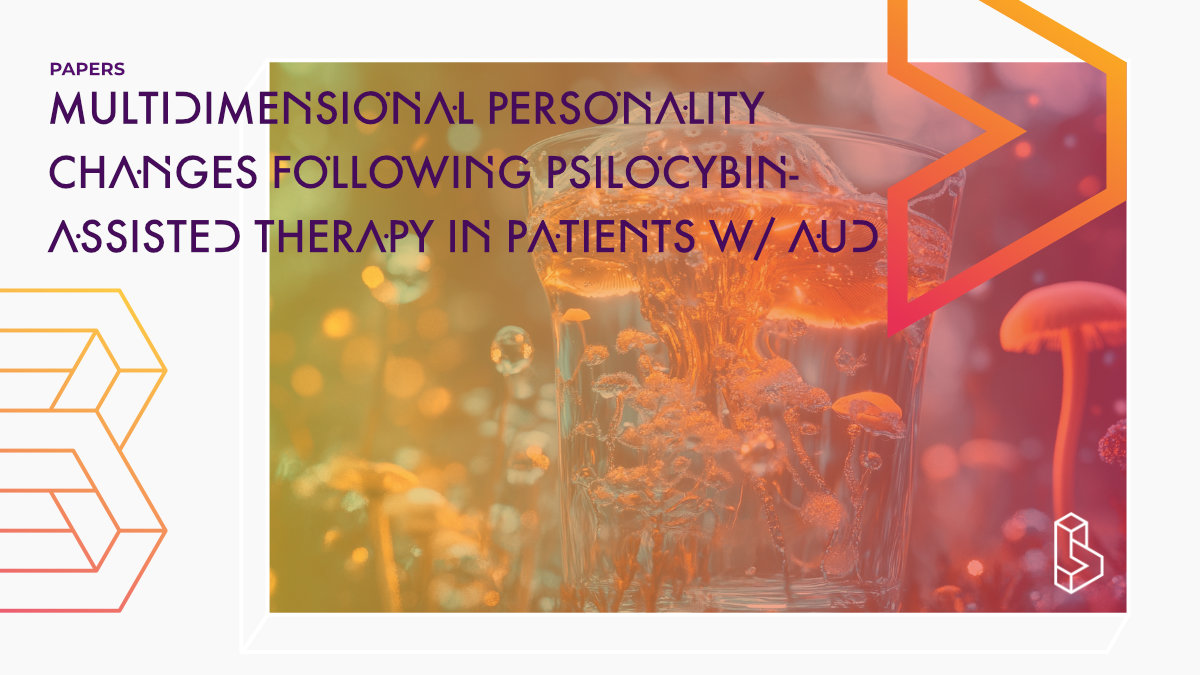This reanalysis of a Phase II study (n=84) investigates the effects of psilocybin-assisted therapy (PAT) on personality traits in alcohol use disorder (AUD). Psilocybin (2x, 25-40mg/70kg; n=44) significantly reduced neuroticism and increased extraversion and openness compared to placebo (diphenhydramine, n=40). Decreased impulsiveness correlated with lower alcohol consumption post-treatment, suggesting PAT may normalize abnormal personality traits in AUD.
Abstract of Multidimensional Personality Changes Following Psilocybin-Assisted Therapy in Patients With Alcohol Use Disorder
“Objective: Evidence suggests that psilocybin-assisted therapy (PAT) leads to durable shifts in personality structure. However, such changes have yet to be characterized in disorders of addiction. In this secondary analysis from a randomized controlled trial, the authors examined the effect of PAT on personality dimensions in patients with alcohol use disorder (AUD), hypothesizing that PAT would attenuate personality abnormalities in AUD and that reductions in trait impulsiveness would be associated with lower drinking.
Methods: Eighty-four adults with AUD were randomized to two medication sessions of either psilocybin (N=44) or active placebo (diphenhydramine; N=40), received 12 weekly psychotherapy sessions, and completed follow-up for an additional 24 weeks. Changes in personality traits (week 36 vs. baseline) were assessed with the revised NEO Personality Inventory; daily alcohol consumption was quantified using the timeline followback.
Results: Relative to the placebo group, the psilocybin group showed significant reductions in neuroticism and increases in extraversion and openness. Secondary analyses showed that reductions in neuroticism were driven by decreases in the facets depression, impulsiveness, and vulnerability; increases in openness were driven by increases in the facets openness toward feelings and fantasy. Across all participants, decreases in impulsiveness were associated with lower posttreatment alcohol consumption, and an exploratory analysis revealed that these associations were strongest among psilocybin-treated participants who continued moderate- or high-risk drinking prior to the first medication session.
Conclusions: PAT elicited durable shifts in personality, suggesting normalization of abnormal personality trait expression in AUD. Further study is needed to clarify whether PAT exerts its beneficial effects by reducing impulsiveness or whether impulsive individuals inherently respond better to PAT.”
Authors: Broc A. Pagni, Richard J. Zeifman, Sarah E. Mennenga, Brennan M. Carrithers, Noam Goldway, Snehal Bhatt, Kelley C. O’Donnell, Stephen Ross, Michael P. Bogenschutz
Summary of Multidimensional Personality Changes Following Psilocybin-Assisted Therapy in Patients With Alcohol Use Disorder
Alcohol use disorder (AUD) is associated with pathological personality traits, including heightened neuroticism and diminished conscientiousness, openness, extraversion, and agreeableness. These personality impairments contribute to AUD’s treatment-resistant nature. Earlier research suggests that changes in personality traits can predict long-term alcohol use behaviours, particularly impulsiveness, which strongly correlates with negative drinking outcomes. These insights support developing interventions aimed at normalising personality traits to improve treatment outcomes.
Psilocybin, a serotonergic psychedelic that primarily acts on the 5-HT2A receptor, has shown promise in treating various mental health conditions, including substance use disorders. Previous studies have indicated that psilocybin-assisted therapy (PAT) can facilitate enduring shifts in personality traits, such as increased openness and reduced neuroticism. However, these effects have not been thoroughly investigated in substance use disorders. This study aimed to evaluate whether PAT induces personality changes in patients with AUD and how these changes relate to clinical outcomes.
Methods
Study Design and Participants
Find this paper
https://doi.org/10.1176/appi.ajp.20230887
Open Access | Google Scholar | Backup | 🕊
Cite this paper (APA)
Pagni, B. A., Zeifman, R. J., Mennenga, S. E., Carrithers, B. M., Goldway, N., Bhatt, S., ... & Bogenschutz, M. P. (2025). Multidimensional personality changes following psilocybin-assisted therapy in patients with alcohol use disorder: results from a double-blind, placebo-controlled clinical trial. American Journal of Psychiatry, 182(1), 114-125.
Study details
Compounds studied
Psilocybin
Placebo
Topics studied
Addiction
Alcohol Use Disorder
Personality
Study characteristics
Original Re-analysis
Placebo-Controlled
Active Placebo
Double-Blind
Randomized
Re-analysis
Participants
84
Humans
Compound Details
The psychedelics given at which dose and how many times
Psilocybin 25 - 40mg | 1x
Linked Research Papers
Notable research papers that build on or are influenced by this paper
Psilocybin-induced changes in neural reactivity to alcohol and emotional cues in patients with alcohol use disorder: an fMRI pilot studyThis reanalysis of a Phase II study (n=11) investigated psilocybin-induced changes in neural reactivity to alcohol and emotional cues in patients with alcohol use disorder (AUD). Participants received psilocybin (25mg; n=5) or diphenhydramine (antihistamine; 50mg; n=6). Psilocybin increased activity in the medial and lateral prefrontal cortex and left caudate, while decreasing activity in several other brain regions. These findings suggest enhanced goal-directed action, improved emotional regulation, and diminished craving.
Percentage of Heavy Drinking Days Following Psilocybin-Assisted Psychotherapy vs Placebo in the Treatment of Adult Patients With Alcohol Use Disorder
This double-blind, active placebo-controlled study (n=95) finds that psilocybin (2x, 25-40mg/70kg) significantly reduced the number of heavy drinking days (10% versus 24% in the placebo group) in the 32-week follow-up period. The trial is the first to test psilocybin for alcoholism (alcohol use disorder, AUD) in a double-blind study.
Linked Clinical Trial
A Double-Blind Trial of Psilocybin-Assisted Treatment of Alcohol DependenceSeveral lines of evidence suggest that classic hallucinogens such as psilocybin can facilitate behaviour change in addictions such as alcohol dependence. The investigation is a multi-site, double-blind, active-controlled trial (n=95, 47 per group) contrasting the acute and persisting effects of psilocybin to those of diphenhydramine (placebo) in the context of outpatient alcoholism treatment.

